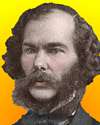 (source)
(source)
|
George Henry Lewes
(18 Apr 1817 - 28 Nov 1878)
English philosopher and naturalist whose early career began as a writer and critic, but he later turned to popularizing science. He was the common-law husband of Mary Ann Evans (pen-name George Eliot).
|
Science Quotes by George Henry Lewes (21 quotes)
A cell is regarded as the true biological atom.
— George Henry Lewes
The Physiology of Common Life (1860), 297.
Every one who has seriously investigated a novel question, who has really interrogated Nature with a view to a distinct answer, will bear me out in saying that it requires intense and sustained effort of imagination.
— George Henry Lewes
In The Principles of Success in Literature (1901), 66.
Genius is rarely able to give any account of its own processes.
— George Henry Lewes
From The Fortnightly Review (1865). Reprinted in The Principles of Success in Literature (1901), 98.
Heart and Brain are the two lords of life. In the metaphors of ordinary speech and in the stricter language of science, we use these terms to indicate two central powers, from which all motives radiate, to which all influences converge.
— George Henry Lewes
From 'The Principles of Success in Literature', The Fortnightly (1865), 1, 66.
In Science the paramount appeal is to the Intellect—its purpose being instruction; in Art, the paramount appeal is to the Emotions—its purpose being pleasure.
— George Henry Lewes
In The Principles of Success in Literature (1901), 63.
It is possible to read books on Natural History with intelligence and profit, and even to make good observations, without a scientific groundwork of biological instruction; and it is possible to arrive at empirical facts of hygiene and medical treatment without any physiological instruction. But in all three cases the absence of a scientific basis will render the knowledge fragmentary and incomplete; and this ought to deter every one from offering an opinion on debatable questions which pass beyond the limit of subjective observations. The psychologist who has not prepared himself by a study of the organism has no more right to be heard on the genesis of the psychical states, or of the relations between body and mind, than one of the laity has a right to be heard on a question of medical treatment.
— George Henry Lewes
The Physical Basis of Mind (1877), 4.
Life is a series of definite and successive changes both in structure and in composition, which take place in an individual without destroying its identity.
— George Henry Lewes
In Problems of Life and Mind: Second Series: the Physical Basis of Mind (1891), 32.
Life is the dynamical condition of the organism.
— George Henry Lewes
In George Henry Lewes, Aristotle (1864), 230.
Many a genius has been slow of growth. Oaks that flourish for a thousand years do not spring up into beauty like a reed.
— George Henry Lewes
In The Spanish Drama: Lope de Vega and Calderon (1846), 60.
Mathematicians do not write for the circulating library.
— George Henry Lewes
From 'The Principles of Success in Literature', The Fortnightly (1865), 1, 90.
Mathematics is a science of Observation, dealing with reals, precisely as all other sciences deal with reals. It would be easy to show that its Method is the same: that, like other sciences, having observed or discovered properties, which it classifies, generalises, co-ordinates and subordinates, it proceeds to extend discoveries by means of Hypothesis, Induction, Experiment and Deduction.
— George Henry Lewes
In Problems of Life and Mind: The Method of Science and its Application (1874), 423-424. [The reals are the relations of magnitude.]
Metaphysical ghosts cannot be killed, because they cannot be touched; but they may be dispelled by dispelling the twilight in which shadows and solidities are easily confounded. The Vital Principle is an entity of this ghostly kind; and although the daylight has dissipated it, and positive Biology is no longer vexed with its visitations, it nevertheless reappears in another shape in the shadowy region of mystery which surrounds biological and all other questions.
— George Henry Lewes
The History of Philosophy from Thales to Comte (1867), lxxxiv.
No deeply-rooted tendency was ever extirpated by adverse argument. Not having originally been founded on argument, it cannot be destroyed by logic.
— George Henry Lewes
In Problems of Life and Mind (1874), Vol. 1, 7.
Originality is independence, not rebellion; it is sincerity, not antagonism.
— George Henry Lewes
In The Principles of Success in Literature (1901), 115.
Science is not addressed to poets.
— George Henry Lewes
From 'The Principles of Success in Literature', The Fortnightly (1865), 1, 90.
Science is the systematic classification of experience.
— George Henry Lewes
The Physical Basis of Mind (1877), 4.
The Anatomist attempts to discover the mechanism; the physiologist attempts to detect the influence which each part exercises.
— George Henry Lewes
In The Physiology of Common Life (1864), Vol. 2, 79.
The discoverer and the poet are inventors; and they are so because their mental vision detects the unapparent, unsuspected facts, almost as vividly as ocular vision rests on the apparent and familiar.
— George Henry Lewes
From 'The Principles of Success in Literature', The Fortnightly (1865), 1, 574.
To one man a stream is so much water-power, to another a rendezvous for lovers.
— George Henry Lewes
In The Principles of Success in Literature (1901), 95.
We must never assume that which is incapable of proof.
— George Henry Lewes
The Physiology of Common Life (1860), Vol. 2, 290.
Whatever lies beyond the limits of experience, and claims another origin than that of induction and deduction from established data, is illegitimate.
— George Henry Lewes
In Problems of Life and Mind (1874), Vol. 1, 17.
Quotes by others about George Henry Lewes (1)
[L]et us not overlook the further great fact, that not only does science underlie sculpture, painting, music, poetry, but that science is itself poetic. The current opinion that science and poetry are opposed is a delusion. … On the contrary science opens up realms of poetry where to the unscientific all is a blank. Those engaged in scientific researches constantly show us that they realize not less vividly, but more vividly, than others, the poetry of their subjects. Whoever will dip into Hugh Miller’s works on geology, or read Mr. Lewes's “Seaside Studies,” will perceive that science excites poetry rather than extinguishes it. And whoever will contemplate the life of Goethe will see that the poet and the man of science can co-exist in equal activity. Is it not, indeed, an absurd and almost a sacrilegious belief that the more a man studies Nature the less he reveres it? Think you that a drop of water, which to the vulgar eye is but a drop of water, loses anything in the eye of the physicist who knows that its elements are held together by a force which, if suddenly liberated, would produce a flash of lightning? Think you that what is carelessly looked upon by the uninitiated as a mere snow-flake, does not suggest higher associations to one who has seen through a microscope the wondrously varied and elegant forms of snow-crystals? Think you that the rounded rock marked with parallel scratches calls up as much poetry in an ignorant mind as in the mind of a geologist, who knows that over this rock a glacier slid a million years ago? The truth is, that those who have never entered upon scientific pursuits know not a tithe of the poetry by which they are surrounded. Whoever has not in youth collected plants and insects, knows not half the halo of interest which lanes and hedge-rows can assume. Whoever has not sought for fossils, has little idea of the poetical associations that surround the places where imbedded treasures were found. Whoever at the seaside has not had a microscope and aquarium, has yet to learn what the highest pleasures of the seaside are. Sad, indeed, is it to see how men occupy themselves with trivialities, and are indifferent to the grandest phenomena—care not to understand the architecture of the Heavens, but are deeply interested in some contemptible controversy about the intrigues of Mary Queen of Scots!—are learnedly critical over a Greek ode, and pass by without a glance that grand epic written by the finger of God upon the strata of the Earth!
In Education: Intellectual, Moral, and Physical (1889), 82-83.
See also:
- 18 Apr - short biography, births, deaths and events on date of Lewes's birth.
- George Henry Lewes - context of quote “A cell is regarded as the true biological atom.” - Medium image (500 x 250 px)
- George Henry Lewes - context of quote “A cell is regarded as the true biological atom.” - Large image (800 x 400 px)
- George Henry Lewes - context of quote “We must never assume that which is incapable of proof.” - Medium image (500 x 250 px)
- George Henry Lewes - context of quote “We must never assume that which is incapable of proof.” - Large image (800 x 400 px)
- George Henry Lewes - context of quote “Systematic classification” - Medium image (500 x 250 px)
- George Henry Lewes - context of quote “Systematic classification” - Large image (800 x 400 px)
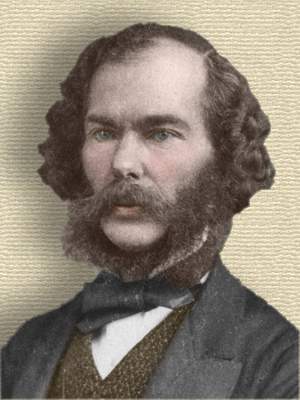
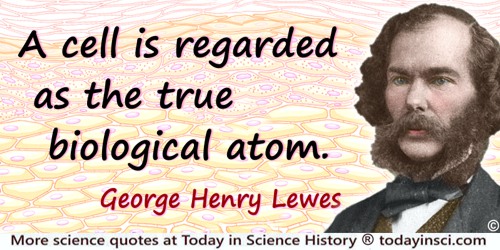
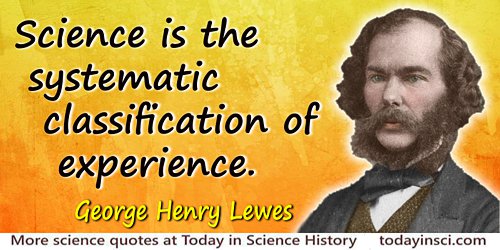


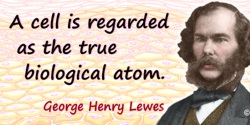
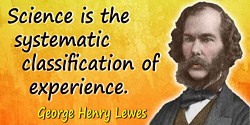
 In science it often happens that scientists say, 'You know that's a really good argument; my position is mistaken,' and then they would actually change their minds and you never hear that old view from them again. They really do it. It doesn't happen as often as it should, because scientists are human and change is sometimes painful. But it happens every day. I cannot recall the last time something like that happened in politics or religion.
(1987) --
In science it often happens that scientists say, 'You know that's a really good argument; my position is mistaken,' and then they would actually change their minds and you never hear that old view from them again. They really do it. It doesn't happen as often as it should, because scientists are human and change is sometimes painful. But it happens every day. I cannot recall the last time something like that happened in politics or religion.
(1987) -- 


